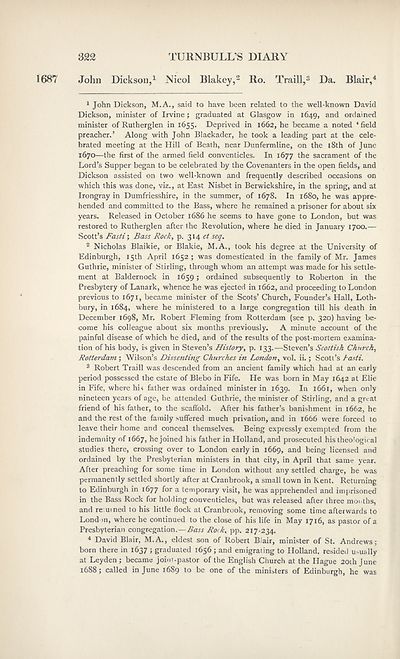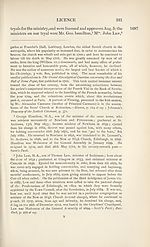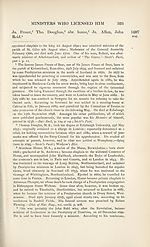Series 1 > Miscellany of the Scottish History Society (First volume)
(419) Page 322
Download files
Complete book:
Individual page:
Thumbnail gallery: Grid view | List view

322
TURNBULL’S DIARY
1687 John Dickson,1 Nicol Blakey,2 Ro. Traill,3 Da. Blair,4
1 John Dickson, M.A., said to have been related to the well-known David
Dickson, minister of Irvine; graduated at Glasgow in 1649, and ordained
minister of Rutherglen in 1655. Deprived in 1662, he became a noted ‘field
preacher.’ Along with John Blackader, he took a leading part at the cele¬
brated meeting at the Hill of Beath, near Dunfermline, on the 18th of June
1670—the first of the armed field conventicles. In 1677 the sacrament of the
Lord’s Supper began to be celebrated by the Covenanters in the open fields, and
Dickson assisted on two well-known and frequently described occasions on
which this was done, viz., at East Nisbet in Berwickshire, in the spring, and at
Irongray in Dumfriesshire, in the summer, of 1678. In 1680, he was appre¬
hended and committed to the Bass, where he remained a prisoner for about six
years. Released in October 1686 he seems to have gone to London, but was
restored to Rutherglen after the Revolution, where he died in January 1700.—
Scott’s Fasti; Bass Rock, p. 314 et seq.
2 Nicholas Blaikie, or Blakie, M.A., took his degree at the University of
Edinburgh, 15th April 1652 ; was domesticated in the family of Mr. James
Guthrie, minister of Stirling, through whom an attempt was made for his settle¬
ment at Baldernock in 1659; ordained subsequently to Roberton in the
Presbytery of Lanark, whence he was ejected in 1662, and proceeding to London
previous to 1671, became minister of the Scots’ Church, Founder’s Hall, Loth-
bury, in 1684, where he ministered to a large congregation till his death in
December 1698, Mr. Robert Fleming from Rotterdam (see p. 320) having be¬
come his colleague about six months previously. A minute account of the
painful disease of which he died, and of the results of the post-mortem examina¬
tion of his body, is given in Steven’s History, p. 133.—Steven’s Scottish Church,
Rotterdam ; Wilson’s Dissenting Churches in London, vol. ii.; Scott’s Lasti.
3 Robert Traill was descended from an ancient family which had at an early
period possessed the estate of Blebo in Fife. He was born in May 1642 at Elie
in Fife, where his father was ordained minister in 1639. In 1661, when only
nineteen years of age, he attended Guthrie, the minister of Stirling, and a great
friend of his father, to the scaffold. After his father’s banishment in 1662, he
and the rest of the family suffered much privation, and in 1666 were forced to
leave their home and conceal themselves. Being expressly exempted from the
indemnity of 1667, he joined his father in Holland, and prosecuted his theological
studies there, crossing over to London early in 1669, and being licensed and
ordained by the Presbyterian ministers in that city, in April that same year.
After preaching for some time in London without any settled charge, he was
permanently settled shortly after at Cranbrook, a small town in Kent. Returning
to Edinburgh in 1677 for a temporary visit, he was apprehended and imprisoned
in the Bass Rock for holding conventicles, but was released after three moi.ths,
and reiumed to his little flock at Cranbrook, removing some time afterwards to
London, where he continued to the close of his life in May 1716, as pastor of a
Presbyterian congregation.—Bass Rock, pp. 217-234.
4 David Blair, M.A., eldest son of Robert Biair, minister of St. Andrews;
born there in 1637 ; graduated 1656 ; and emigrating to Holland, resided u-ually
at Leyden; became joint-pastor of the English Church at the Hague 20th June
1688; called in June 1689 to be one of the ministers of Edinburgh, he was
TURNBULL’S DIARY
1687 John Dickson,1 Nicol Blakey,2 Ro. Traill,3 Da. Blair,4
1 John Dickson, M.A., said to have been related to the well-known David
Dickson, minister of Irvine; graduated at Glasgow in 1649, and ordained
minister of Rutherglen in 1655. Deprived in 1662, he became a noted ‘field
preacher.’ Along with John Blackader, he took a leading part at the cele¬
brated meeting at the Hill of Beath, near Dunfermline, on the 18th of June
1670—the first of the armed field conventicles. In 1677 the sacrament of the
Lord’s Supper began to be celebrated by the Covenanters in the open fields, and
Dickson assisted on two well-known and frequently described occasions on
which this was done, viz., at East Nisbet in Berwickshire, in the spring, and at
Irongray in Dumfriesshire, in the summer, of 1678. In 1680, he was appre¬
hended and committed to the Bass, where he remained a prisoner for about six
years. Released in October 1686 he seems to have gone to London, but was
restored to Rutherglen after the Revolution, where he died in January 1700.—
Scott’s Fasti; Bass Rock, p. 314 et seq.
2 Nicholas Blaikie, or Blakie, M.A., took his degree at the University of
Edinburgh, 15th April 1652 ; was domesticated in the family of Mr. James
Guthrie, minister of Stirling, through whom an attempt was made for his settle¬
ment at Baldernock in 1659; ordained subsequently to Roberton in the
Presbytery of Lanark, whence he was ejected in 1662, and proceeding to London
previous to 1671, became minister of the Scots’ Church, Founder’s Hall, Loth-
bury, in 1684, where he ministered to a large congregation till his death in
December 1698, Mr. Robert Fleming from Rotterdam (see p. 320) having be¬
come his colleague about six months previously. A minute account of the
painful disease of which he died, and of the results of the post-mortem examina¬
tion of his body, is given in Steven’s History, p. 133.—Steven’s Scottish Church,
Rotterdam ; Wilson’s Dissenting Churches in London, vol. ii.; Scott’s Lasti.
3 Robert Traill was descended from an ancient family which had at an early
period possessed the estate of Blebo in Fife. He was born in May 1642 at Elie
in Fife, where his father was ordained minister in 1639. In 1661, when only
nineteen years of age, he attended Guthrie, the minister of Stirling, and a great
friend of his father, to the scaffold. After his father’s banishment in 1662, he
and the rest of the family suffered much privation, and in 1666 were forced to
leave their home and conceal themselves. Being expressly exempted from the
indemnity of 1667, he joined his father in Holland, and prosecuted his theological
studies there, crossing over to London early in 1669, and being licensed and
ordained by the Presbyterian ministers in that city, in April that same year.
After preaching for some time in London without any settled charge, he was
permanently settled shortly after at Cranbrook, a small town in Kent. Returning
to Edinburgh in 1677 for a temporary visit, he was apprehended and imprisoned
in the Bass Rock for holding conventicles, but was released after three moi.ths,
and reiumed to his little flock at Cranbrook, removing some time afterwards to
London, where he continued to the close of his life in May 1716, as pastor of a
Presbyterian congregation.—Bass Rock, pp. 217-234.
4 David Blair, M.A., eldest son of Robert Biair, minister of St. Andrews;
born there in 1637 ; graduated 1656 ; and emigrating to Holland, resided u-ually
at Leyden; became joint-pastor of the English Church at the Hague 20th June
1688; called in June 1689 to be one of the ministers of Edinburgh, he was
Set display mode to:
![]() Universal Viewer |
Universal Viewer | ![]() Mirador |
Large image | Transcription
Mirador |
Large image | Transcription
Images and transcriptions on this page, including medium image downloads, may be used under the Creative Commons Attribution 4.0 International Licence unless otherwise stated. ![]()
| Scottish History Society volumes > Series 1 > Miscellany of the Scottish History Society (First volume) > (419) Page 322 |
|---|
| Permanent URL | https://digital.nls.uk/127085889 |
|---|
| Attribution and copyright: |
|
|---|
| Description | Over 180 volumes, published by the Scottish History Society, containing original sources on Scotland's history and people. With a wide range of subjects, the books collectively cover all periods from the 12th to 20th centuries, and reflect changing trends in Scottish history. Sources are accompanied by scholarly interpretation, references and bibliographies. Volumes are usually published annually, and more digitised volumes will be added as they become available. |
|---|


